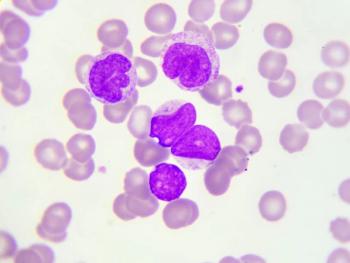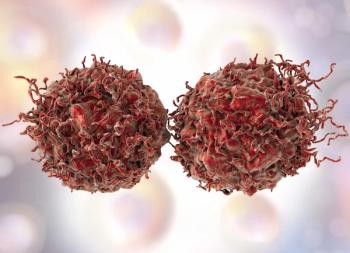
Tafasitamab plus lenalidomide prolonged overall survival compared with systemic therapies in patients with relapsed/refractory diffuse large B-cell lymphoma, according to data from the retrospective RE-MIND2 study.

Your AI-Trained Oncology Knowledge Connection!


Nicholas Wrigley formerly wrote for CancerNetwork and was an editor for the journal ONCOLOGY.
He is a writer of fiction; his work has appeared in a local anthology, the Best Short Stories of Philadelphia, and elsewhere. He holds an MFA in Creative Writing from Temple University and spends most of his spare time reading books, writing books, playing video games, or sleeping. He has inexplicably strong opinions on East European history, Star Wars, and pasta. He lives in Greater Philadelphia with his family and, more importantly, their two dogs.

Tafasitamab plus lenalidomide prolonged overall survival compared with systemic therapies in patients with relapsed/refractory diffuse large B-cell lymphoma, according to data from the retrospective RE-MIND2 study.

Data from a pivotal phase 3 trial support a recent biologics license application for denileukin diftitox that was submitted to the FDA.

A secondary end point analysis of the phase 2 TUXEDO-1 trial found that trastuzumab deruxtecan improved outcomes without significantly impacting quality of life for patients with HER2-positive breast cancer with CNS metastases.

A recent analysis of data from the phase 3 PEACE-1 study reveals a correlation between 8-month prostate-specific antigen levels and survival outcomes in patients with metastatic castration-sensitive prostate cancer who are treated with systemic therapy regimens that include androgen deprivation therapy.

Treatment with gavocabtagene autoleucel demonstrated efficacy and tolerability in patients with mesothelin-expressing solid tumors, according to updated data from an ongoing phase 1/2 clinical trial.

Patient-reported outcome data from the phase 3b OReO/ENGOT-ov38 trial showed no significant effect on quality of life following rechallenge with maintenance olaparib in patients with platinum-sensitive relapsed ovarian cancer.

Results from the phase 3 KEYLYNK-010 study showed that treatment with pembrolizumab and olaparib did not result in a statistically significant improvement in survival despite yielding higher responses compared with novel hormonal agents in patients with previously treated prostate cancer.

Kim Blenman, PhD, MS, discussed the promising developments in cell-counting software for predicting pathologic complete response in breast cancer.

Chiara Cremolini, MD, PhD, discussed results from the phase 3 TRIPLETE study of triplet chemotherapy plus panitumumab in previously untreated patients with RAS/BRAF wild-type unresectable metastatic colorectal cancer.

Doris K. Hansen, MD, discussed results of an efficacy analysis examining the BCMA-directed CAR T-cell therapy idecabtagene vicleucel in real-world treatment of patients with relapsed/refractory multiple myeloma.

Olaparib and bevacizumab has been approved in China as a frontline maintenance treatment for patients with advanced homologous recombination deficiency–positive ovarian cancer based on results from the phase 3 PAOLA-1 trial.

Anne Chiang, MD, PhD, discussed results from a pilot study of biomarkers in tumors treated with ipilimumab and nivolumab in extensive-stage small cell lung cancer.

Charu Aggarwal, MD, MPH, discussed findings from a study of the replication-deficient adenovirus CAN-2409 in advanced non–small cell lung cancer.

The FDA has granted orphan drug designation to second-line GNS561 following the completion of a phase 1/2a trial evaluating the novel PPT1 inhibitor in liver cancer and cholangiocarcinoma.

Mary E.R. O’Brien, MBBS, discussed results of an exploratory analysis of the phase 3 PEARLS/KEYNOTE-091 study examining pembrolizumab in resected non–small cell lung cancer.

Charles M. Rudin, MD, PhD, discussed results of the phase 3 SKYSCRAPER-02 trial examining atezolizumab with carboplatin and etoposide with or without tiragolumab in untreated extensive-stage small cell lung cancer.

Akihiro Ohba, MD, discussed the potential benefits of T-DXd in HER2-expressing biliary tract cancer.

Ulka N. Vaishampayan, MBBS, discussed the potential benefits of oral docetaxel plus ritonavir in metastatic castration-resistant prostate cancer.

Eric J. Sherman, MD, discussed the effects of using the MEK inhibitor trametinib in combination with paclitaxel in metastatic anaplastic thyroid cancer.

Community health worker–led interventions appeared to improve outcomes among patients with newly diagnosed advanced-stage or recurrent solid and hematologic cancers.

Three months of neoadjuvant chemotherapy may downstage early-stage rectal cancer and thereby reduce the need for total mesorectal excisions (TMEs), resulting in higher rates of organ preservation.

Christine Parseghian, MD, discussed the effects of rechallenging patients with a prior response to EGFR inhibition with panitumumab plus or minus the MEK inhibitor trametinib in RAS/BRAF wildtype, microsatellite stable colorectal cancer.

Aditya Bardia, MD, MPH, discussed final results from the phase 3 ASCENT study evaluating sacituzumab govitecan vs physician’s choice of single-agent chemotherapy for patients with relapsed or refractory metastatic triple-negative breast cancer.

Health Canada approved nivolumab in combination with platinum-doublet chemotherapy for the neoadjuvant treatment of patients with resectable non–small cell lung cancer prior to surgery.